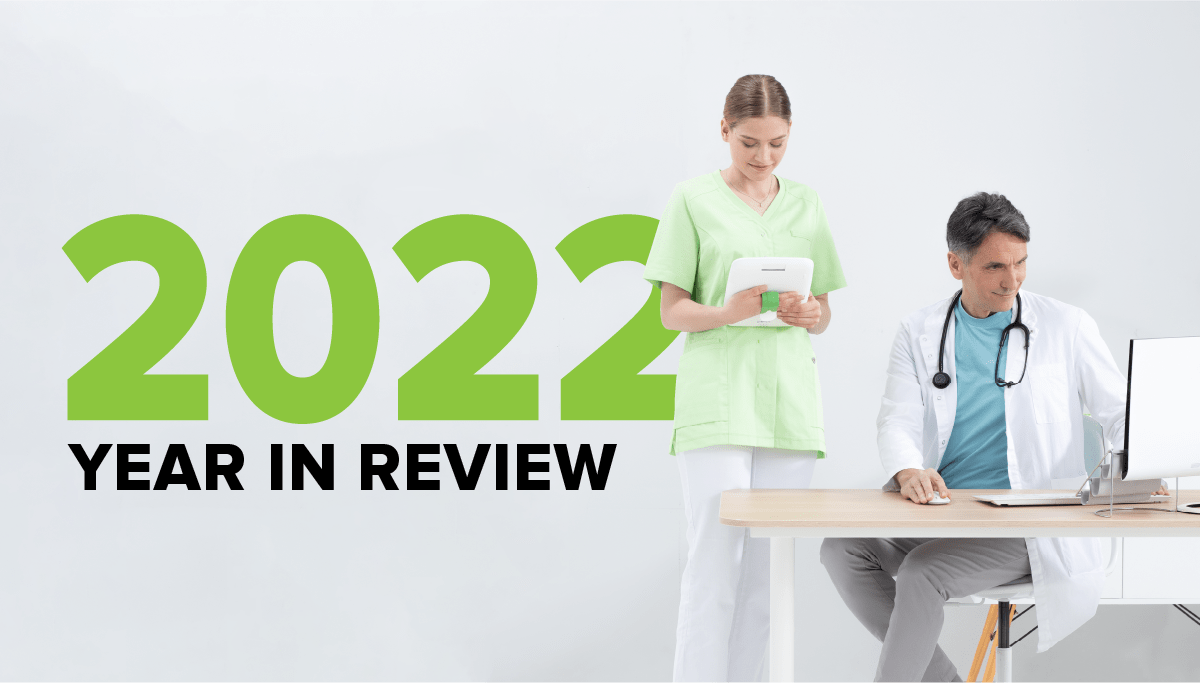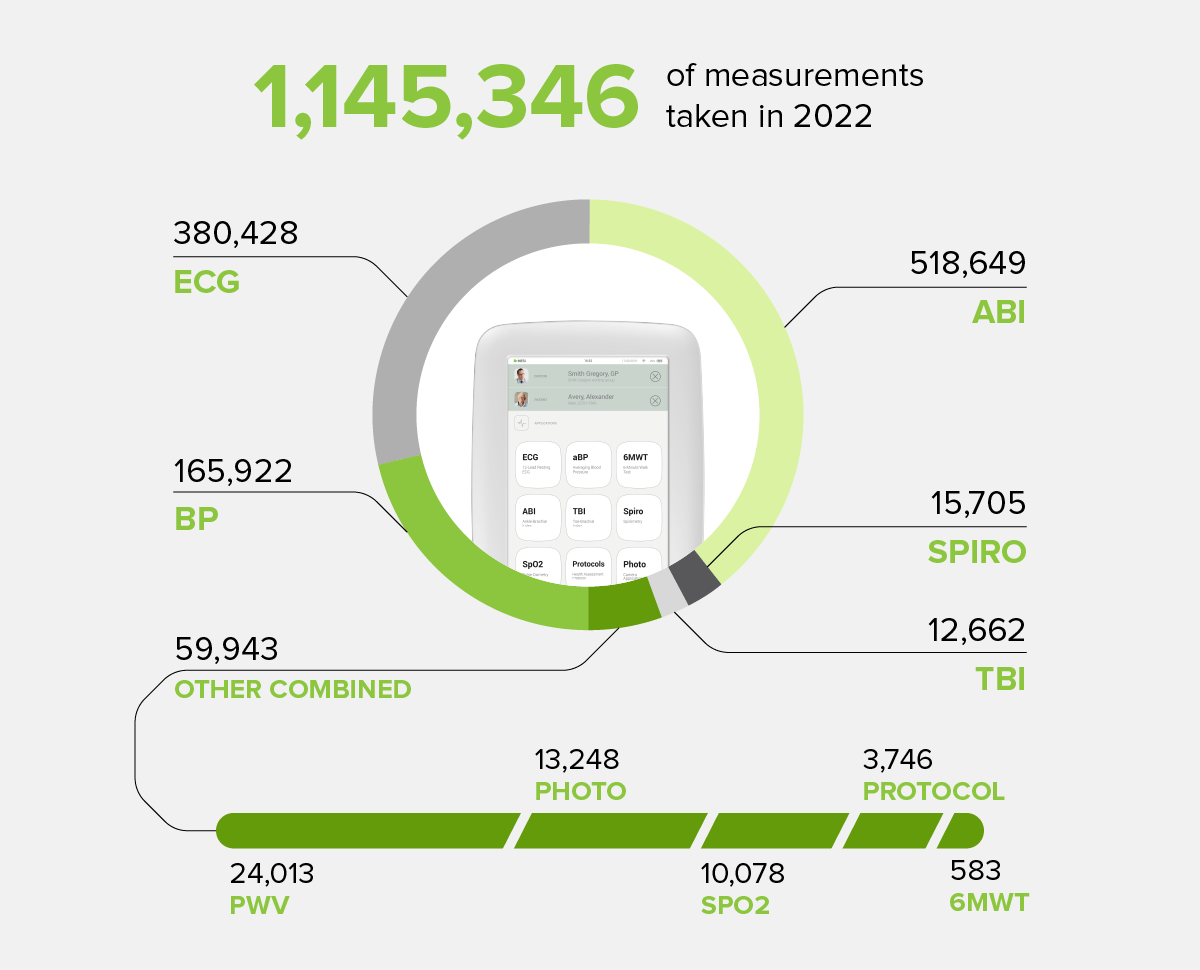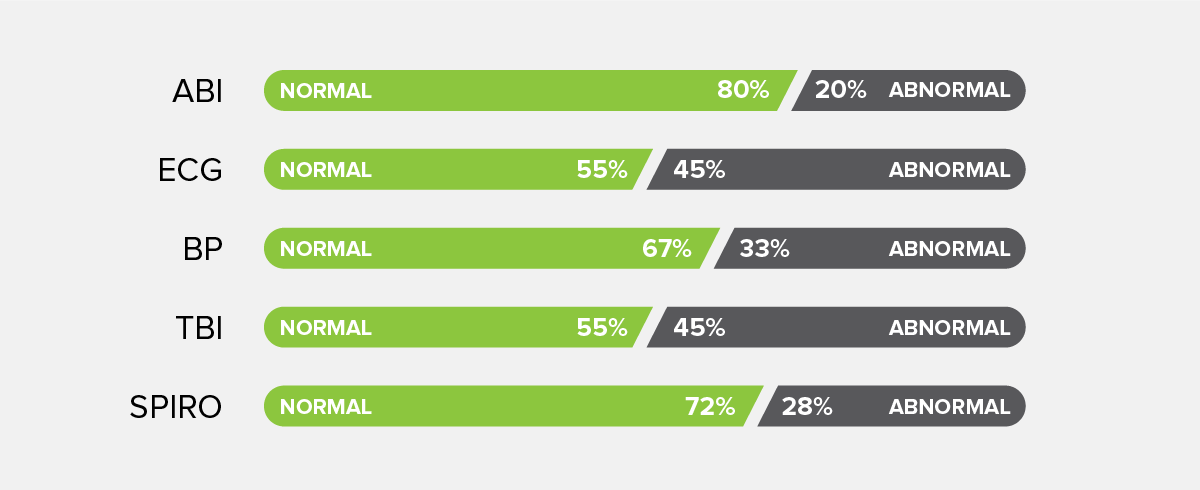MESI in 2022: A year in review
2022 was the busiest year for MESI so far. It was marked by huge impact for patients and doctors alike as a result of record MESI mTABLET activation growth. We also went from strength to strength in our long-term mission – that of digitalizing medical assessment with our innovative concept of predictive medical assessment, which will also mark the current year. Let’s have a look at the MESI efforts and achievements that made last year go by in a flash.

Company highlights
MESI opened many new chapters in 2022, with the aim of strengthening our presence worldwide and providing the best possible support to our partners and product users.
Growth enhanced with know-how: MESI welcomed Mr. Oliver Heine, President and CEO at HEINE Optotechnik, as a new investor and strategic advisor to accelerate growth.
A record number of MESI mTABLETs was activated by end users in 2022, which is 57 % more than in 2021
Important new clinical study: The MESI system ranked highest in a study made for the UK NHS AAA, and is now a preferred solution to be used in a broader PAD population screening programme. The authors of the systematic review come from the University of Leicester, the University Hospitals of Leicester NHS Trust, the National Institute for Health Research (NIHR) and the Leicester Biomedical Research Centre.
New team members: More than 20 new employees joined us last year, increasing our team to nearly 100 including branch offices. We aim to extend our sales force in the key markets even further also with help of a newly established Education Department. It focuses on educating our sales team, partners and customers while our new Business Development Department supports our intracommunication and the development of existing and new markets.
New markets: The MESI mTABLET was officially introduced on the Canadian market through Digitalizing Medical Practices in Canada, a series of MESI kick-off events.
New patent: MESI received a European and US patent for a compression garment equipped with a smart compression sensor.
New MESI website: the website is dedicated to the advantages of digitalizing medical assessment in different areas of healthcare, with video demonstrations of nearly all our products.
Product launches
New product launches:
SCORE2: The first big feature within our Predictive Medical Assessment concept: SCORE2 is a prediction model estimating 10-year risk of cardiovascular disease in European patients.
Advanced Spirometry (Spiro+) app: the most versatile digital spirometer for specialists. It can easily be added to the MESI mTABLET SPIRO module in the form of an app. It features advanced measurement models, including the animated incentive mode.
The new edition MESI ABPI MD: a brand new version of our first product, which has dominated its segment for a decade.
Measurements
In 2022, MESI mTABLET users performed more than 1 million diagnostic measurements. Shown below is a breakdown of the most frequently performed measurements and used apps. As evident, the most frequently performed measurements were ECG and ABI.

In total, there were more than 225,000 user logins into the MESI mTABLET in 2022. An average of 21% healthcare professionals used our devices in a day and 50% on a weekly basis.

The MESI mTABLET helped clinicians get to an early assessment of a diseases or a condition in almost 1.2 million patient visits. A case of disease or condition was identified in more than 220,000 patients already at a primary care level, providing them with an opportunity for treatment. Clinicians using the MESI mTABLET have shared nearly 42,000 measurements for a second opinion. In this way, they saved their patients days of potential hospital stay and helped start their treatment earlier.
According to a study from 2020, which compared Doppler and ABPI assessments with an automated ABPI device, ABPI measurements are up to 6 times faster. A Doppler exam takes 30 minutes; considering that nearly 520,000 patients were examined with the MESI mTABLET ABI last year, this means a considerable time saver for both the patients and especially for the medical staff.
ABI<=0.9 was measured in 20% of the above cases. This means that, on average, we helped discovering more than 400 patients a day who were at high risk for Peripheral Arterial Disease (PAD). If the ABI did not show a conclusive result, the Toe-Brachial Index (TBI) measurement was performed, which was a total of 12,662 times. In these cases, abnormal TBI results with TBI<0.7 were obtained in 16%. Overall, however, TBI<0.7 was discovered in 46% of the patients measured.
The SPIRO measurement was performed 15,705 times, with 28% of the cases indicating abnormal medical conditions that could mean ventilator dysfunction or any type of pulmonary disease.
Regarding our ECG, there was more than 380,000 measurements performed. Automatic interpretation showed abnormality in 46% of the cases.
Blood pressure (BP) was measured in a total of 684,571 instances. In more than 40%, SYS or DIA was >=140/90, which means these patients are at high risk for hypertension grade 1.

New clinical studies
Start of an observational study using the MESI mTABLET ABI and the MESI mTABLET TBI on diabetic patients under the coordination of Dr. Mario D´Uva from Latina, Italy. Throughout the study, MESI’s automated technology will help discover PAD patients regardless of their symptoms, with the aim of positively affecting long-term treatment outcomes.
The MESI system ranked highest in a study made for the UK NHS AAA, and is now a preferred solution to be used for a broader PAD population screening programme. The authors of the systematic review come from the University of Leicester, the University Hospitals of Leicester NHS Trust, the National Institute for Health Research (NIHR) and the Leicester Biomedical Research Centre.
Two new clinical studies with the MESI system launched in the UK: The first one tests the validity and reliability of automated Ankle-Brachial Index measurements at Hull Royal Infirmary. The second one explores the shortening of visit time at a wound care clinic after the introduction of pre-treatment visits, where the MESI system is used.
A MESI device was used in a Slovenian study published at the end of 2022. The study researches the relationship between serum zinc (Zn), the Ankle-Brachial Index (ABI, indicator of atherosclerosis), and mortality in patients with chronic haemodialysis. The MESI device was used for measuring the ABI of the study participants – patients with end-stage renal disease (ESRD) who were receiving haemodialysis.
Other highlights
2022 brought a return of live events and travel, which enabled us to spend more time with our partners. We participated in more than 20 partner events worldwide. It is always a valuable learning experience for us to spend time with you at events, so we hope these trends continue this year as well.
With live events reinstated, we were finally able to host our 3rd Partner Conference! It mainly focused on Predictive Medical Assessment, offering more than 50 attendees from all over the world a glimpse into our future development.
After a long time of pandemic restrictions, our traditional MESI Development Days, MESI Sales Days and MESI Teambuilding came back stronger and more inspiring than ever!
Our software developer Tajda Bogovič was nominated for Slovenian Woman Engineer of the Year and also became Chair of IEEE WiE Slovenia. IEEE WiE (Institute of Electrical and Electronics Engineers – Women in Engineering) is a global network of IEEE members and volunteers promoting women engineers and scientists worldwide.
Looking ahead
Our most important goal in 2023 is to keep raising the awareness in the medical community about the advantages of digital tools for its daily work. The aim of solutions like the MESI mTABLET is to reduce paperwork through automatic result storage in the patient files, and to enable instant sharing of the measurements for a second or specialist opinion. In this, electronic patient files are easy to access and do not require paper form.
With new innovations, we will continue to digitalise medical assessment, making it faster and more comprehensive. We are planning to make big steps in the realisation of our comprehensive solution for Predictive Medical Assessment – by unlocking the value of data to help clinicians discover conditions early, predict their onset and development, and contribute to their successful treatment. We are also planning to launch a multi-parameter diagnostic tool for the hospital market.
The entire MESI team is looking forward to collaborating with you in 2023. By working together, we can make it another year of success.